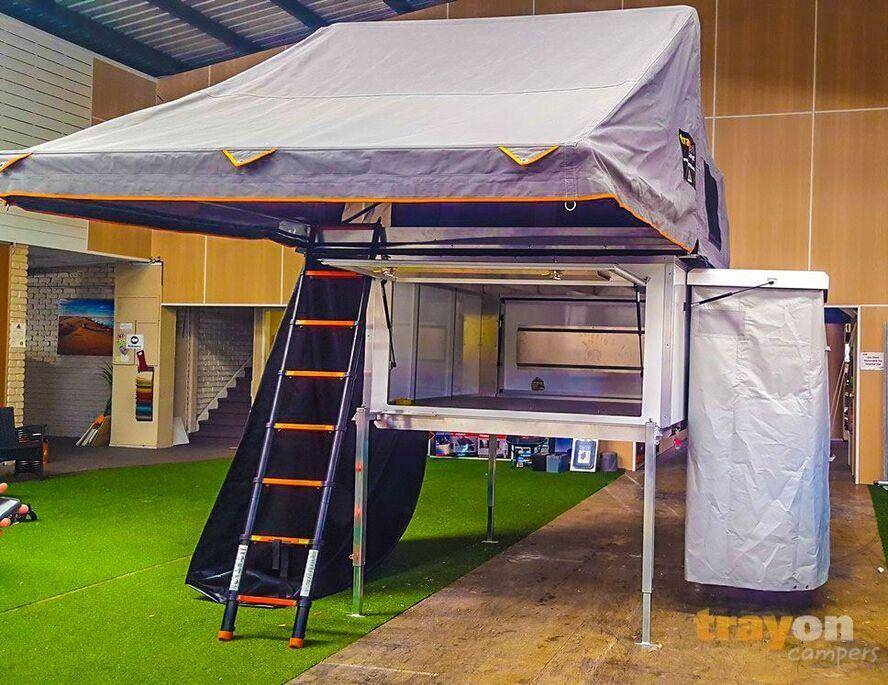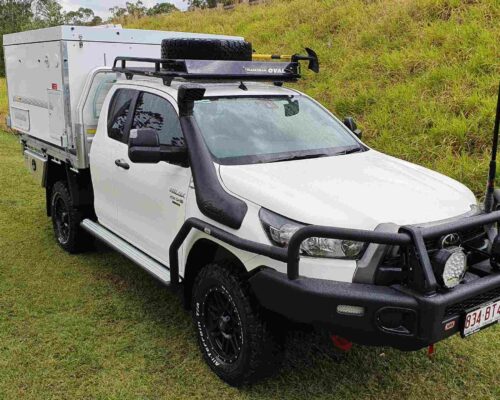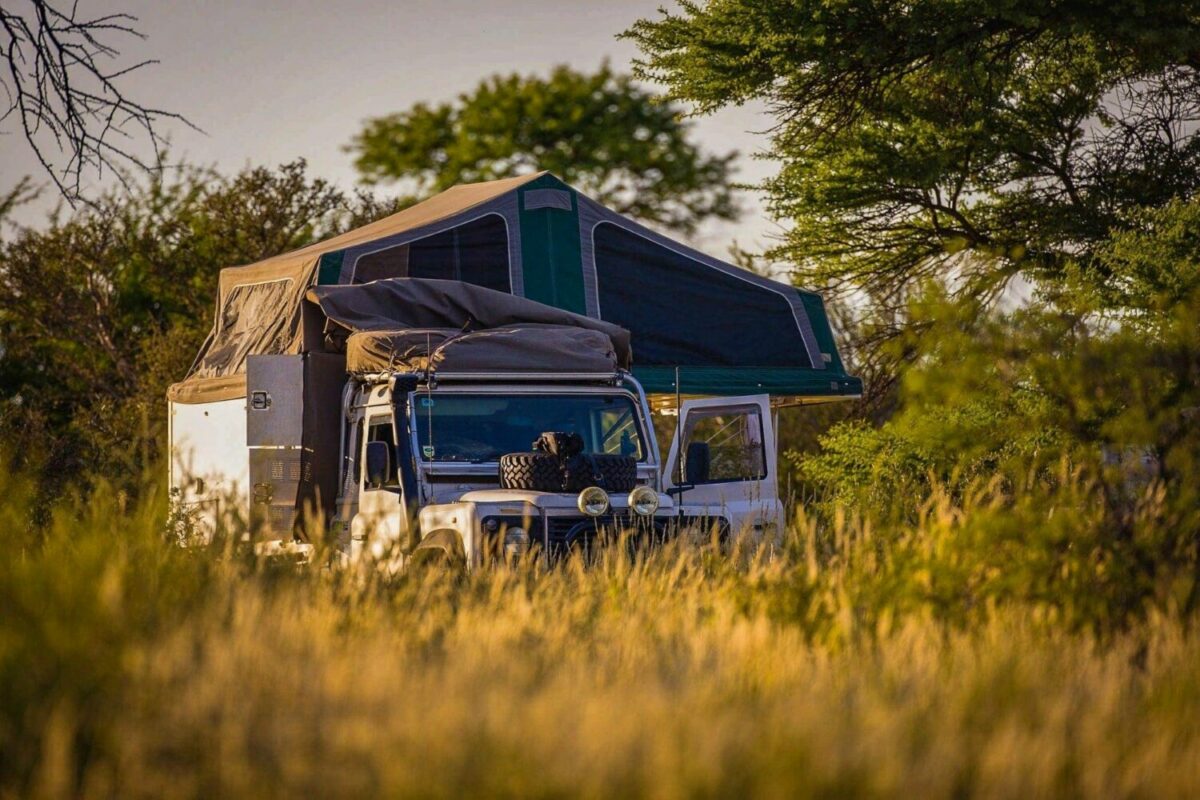
The Australian dream! Well, we are taught that homeownership will lead to a better life. A life that is balanced between work and recreation. Camping and exploring Australia is a big part in that balanced life for many of us.
Exploration is music to the soul to many Aussies, the question is which platform will we do that exploring in? A Slide-on Camper or an Off Road Camper Trailer?
In this post you’ll find everything you need to help you choose the right platform for you.
What this post doesn’t include:
- On Road and Off Road Caravans
- On Road camper trailers
However, there are still some valid points for all types of trailer-based home away from homes.
Okay, let’s get into it. First of all, let’s cover the basics to give some context.
What is an Off Road Camper Trailer?
A off road camper trailer is towed behind a 4WD vehicle to provide a place to sleep which is more comfortable and protected than a tent for use off the beaten track.
Off road camper trailers are a great way to bring large amounts of shelter and comfort into the great outdoors for a weekend away with the kids or a longer journey.
Typically there are three main types of off road camper trailers:
- Box trailer camper
- Hard floor and soft floor fold out camper
- Hybrid caravan/camper
They come in all shapes and sizes. The larger the off-road camper trailer is, the larger tow vehicle needs to be.
The Box Off Road Camper Trailer
Box camper trailers are aptly named, as the original ones were simply the common box trailers converted into campers.
Now days, they are often a dual purpose trade trailer, with a roof top tent, annex, storage and camping equipment attached to it. Both DIY and custom built.
There are also purpose-built box trailer campers which have heavy duty independent suspension and all the camping equipment integrated into the body.
They don’t have a large amount of storage, and generally few sheltered spaces. Usually, the kitchenette is outside in the elements under the annex. But they are commonly the lightest camper trailer type and also the easiest to setup.
Hard and Soft Floor Fold Out Off Road Camper Trailer
These off road camper trailers do away with the rooftop tent and provide a large canvas covered area with all kinds of add ons to create more modular rooms.
This is one of the most common types you see at caravan parks. Great for longer term setups, plenty of room for the kids and space to relax when the weather turns ugly.
They are generally not dual purpose (camping only) as opposed to the box off road camper trailer, and in the cheaper models, the suspension is standard leaf configuration. They have the most shelter but can take up to 20-30 mins to fully setup with the additional rooms.
Hybrid Caravan/Camper Trailer
These off road camper trailers are typically the largest and heaviest, they resemble a small off road caravan, typically have a hard roof or pop top with canvas sides. They are feature rich and have plenty of storage. Very minimal setup time is required.
What is a Slide-on Camper?
A slide on camper is simply a camper which slides onto the back of a pickup/ute that has a flat tray or platform it can be mounted on.
Usually, once at the campsite you can opt to remove it from the vehicle, so you can set up and still go exploring without having to pack up your campsite to use your vehicle. Like you can with a camper trailer.
There are three types or classes of slide on campers. They are:
Class 1: Canopy Slide on
This class is typically a galvanized steel or aluminum canopy on the back of a ute which houses basic utilities such as fridges, kitchen and sometimes a bed.
Like the box trailer, the canopy slide on can be dual purpose for the tradesperson. These are typically the lowest cost and they are a great platform for a roof top tent.

Class 2: Purpose built slide on
This class really represents a more complete camper which are purpose built for being on a tray. They contain the creature comforts that class 1 doesn’t, such as seating, dedicated sleeping, and indoor or outdoor cooking area and you can “walk-in” them as opposed to the class 1.
They typically have a large sheltered area and double/queen bed to seek refuge during bad weather. These are more commonly used for long range 4WD touring in Australia. But can just as easily be used for weekend trips. They take only 2-5mins to setup and pack up, very convenient.

Class 3: Cab over slide on
This class encapsulates slide on campers that are built like a caravan (discussed further below). Essentially, these are slide ons which use caravan manufacturing techniques to build in the creature comforts.
This means they can typically be heavy, tall, hard roof, fixed or pop top and have a cab over design.
Typically, in Australia, these are imported and you would need a ute/truck which has a larger payload than 1 tonne fully loaded. Like an Iveco daily, or Mercedes G Professional.
More information about slide on campers for utes can be found in our post: What is a slide on camper?
Why Choose An Off Road Camper Trailer Over A Slide on Camper?
There may be many reasons why someone would choose a off road camper trailer. One primary reason would be because they do not have 4WD ute, which is required for a Slide on camper. Perhaps an SUV or Wagon 4WD vehicle. Other reasons might be:
- Need to sleep more than 4-5
- Need really simple access in and out of the camper
- Need large amounts of sheltered space
- Planning to camp at caravan sites
- Not planning to do traverse difficult terrain
Why Choose A Slide-on Camper Over A Off Road Camper Trailer?
Slide on campers are either for those who don’t want to tow, or wish to tow something other than the camper, such as boat or jet ski. Slide on campers allow you to go anywhere where your vehicle is capable of going, as some places are just too precarious or restricted for access to off road camper trailers. Other reasons might include:
- Someone who is minimalist in nature
- Sleeping quarters higher off the ground (e.g. keeping away from crocks and snakes)
- Needing to traverse difficult terrain
- Wanting to not have additional maintenance costs
- Wanting to not have additional registration costs
- Wanting to keep light and economical
- Wanting to tow a boat or other toys

Intended Application Comes First
Above all the intended application comes first, creature comforts come second. It is easy to get wrapped up in the aesthetics and creature comforts of the different makes and models of campers out there. But ultimately, if it is not fit for the purpose, no amount of features or paint will prevent it causing pain or grief in a precarious situation in the outback, 1000’s of Km’s from any help.
As the vehicle driver, you are solely responsible for your vehicle and camper setup off road. If it gets stuck, damaged or worse, you will be liable for any damages.
Minimising those risks are essential and starts with choosing a platform which is intentionally designed for the terrain and conditions you will be travelling.
First of all, there are many tracks which are closing or have limited access to trailers for safety and environmental conservation concerns. So make sure you look at all the off road tracks you intend to take to ensure accessibility. Otherwise, you could be in for a big detour.

Secondly, ensure your vehicle is fit for the purpose. Most of the common makes of 1-tonne utes in Australia are not ready for off road travel from the factory floor, let alone towing a off road camper trailer up sand dunes.
You’ll need to consider at the very least a suspension upgrade for your vehicle for while carrying either a off road camper trailer and slide on camper. This will help significantly in reducing the impact on the chassis and axles of carrying or towing the extra weight.
Example of application

There are still a few famous remote outback tracks open to off road camper trailers, however, more and more are closing due to safety concerns and environmental conservation.
The Canning Stock Route is one of those iconic tracks, while the main track is still open for off road camper trailers, most of the side tracks are closed for trailer access. Many people who have done it with a trailer say they wouldn’t take one again for the following reasons:
- its a very long and arduous trip – 1800+ kms and approximately 3-weeks
- with over 1000 dunes, some super tall and soft
- massive stretches of deep corrugations
- many dunes are dug out due to vehicles
- additional strain on vehicle while towing
- potential damage to vehicle and trailer
- potential damage to the track and dunes
- Lot’s of side tracks which you will miss out on with a trailer
- It gets exhausting getting bogged, reversing and trying again
- massive fuel consumption, and in some places over 1000kms between fuel wells
Many remote outback tracks are the same in Australia. Having a light, a manoeuvrable vehicle is essential. And although the off road camper trailer may make it, it will be a tough journey that will definitely take its toll in more ways than one.
So before you choose a platform, ensure you do your research of where you want to travel, including any potential side trips you may want to take. Figure out what is the minimum amount of gear you will need for this application.
Towing vs Not Towing
You need to know that there are trade-offs for both towing and not towing. Towing means you can carry more, carrying more increases the chances for something failing. Things fail in the outback regularly.
Not towing allows you to go to more places, however, the total capacity is reduced.
Towing A Off Road Camper Trailer
Towing means you can theoretically carry more, however, dragging extra gear, chassis, an extra set of heavy axles, and wheels through the desert increase the chances of vehicle or trailer failure significantly.
Some of the other trade offs when towing a off road camper trailer include:
- Extra registration costs
- Higher maintenance costs (wheels, suspension etc)
- Higher fuel consumption
- Less manoeuvrability
- More safety checks
- Less places you can go
- Additional stress added to rear of vehicle chassis
- Additional stress added to drivetrain and suspension
Not Towing an Off Road Camper Trailer
The case for not towing has been around for years. It provides much more manoeuvrability, allows you to travel further and lighter and reduces points of equipment failure.
However, not towing a trailer also has some trade offs compared to a towing a trailer, which include:
- Hard to fit everything you want (accessories, camping gear, water, fuel, people) + the slide on camper within the payload of the ute
- Weight needs to be as close to the center of wheelbase as possible
- Less storage than a trailer
Lifestyle Comparison
Note: These features vary from manufacture to manufacture. They are just a rough guide.
| Lifestyle Feature | Slide-on Camper | Off Road Camper Trailer |
| Outdoor Kitchenette | Yes (optional) | Yes |
| Indoor Kitchenette (away from elements) | Yes | No |
| Water tank | Yes | Yes |
| Gas (hotwater/ burner) | Yes | Yes |
| Heater | Yes (optional) | Yes (optional) |
| No additional registration costs | Yes | No |
| No Additional maintenance costs | Yes | No |
| Tow an additional trailer for toys (boats, motorbikes etc) | Yes | No |
| Travel all over Australia | Yes | Limited |
| Fuel Consumption (Economical) | Yes | No |
| Setup Base Camp | Yes | Yes |
| Setup time | 2-5mins | 10 – 30mins |
| Large Storage capacity | limited | Yes |
| Power inlet (for powered sites) | Yes | Yes |
| Annex | Yes | Yes |
| Battery and inverter | Yes | Yes |
| Fridge | Yes | Yes |
| Indoor dining area | Yes | Yes (optional) |
In Summary
Both off road camper trailers and slide on campers both have their place. Think about your intended application before aesthetics or features.
Identify what amount of risk you are willing to take on if you are planning to tackle some of the more complex terrain Australia has to offer.
If you are interested in slide on campers, check out our post on how to choose a slide on camper for important information regarding vehicle safety.
Safe travels and happy camping!







